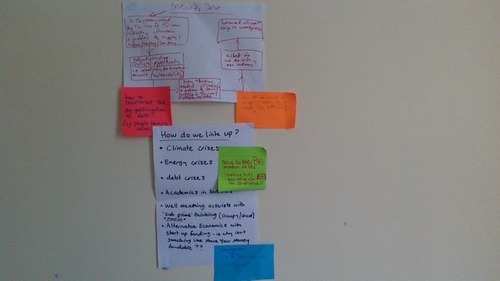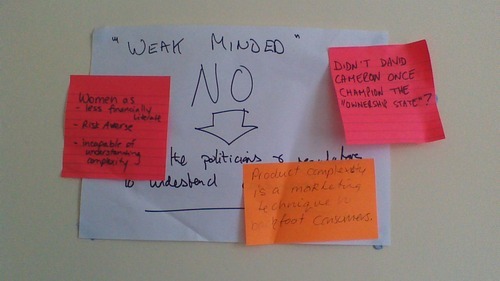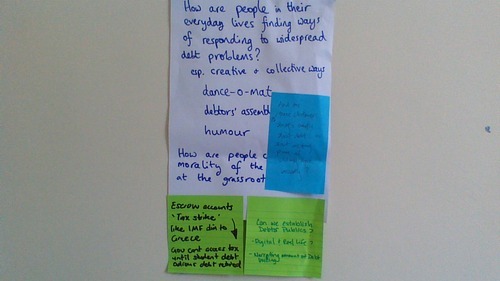Poster: Politics of Debt

This poster creates a schematic of the different steps that the politicsd of debt might take. Taking the example of pay day lending the first step is to diagnose the problem. The next step is to factor in the politics of opportunism. Next, is creating the need for a new way of thinking around the problem of social justice and debt. The next step is to ask: what do we do with our money? > ethical citizenship?
- How to counteract the de-politicisation of debt (e.g. people blaming themselves)
- How do we counter the weight of lobbying by the industry with poiticians
The bottom poster asks us to think about how the debt economy links to other issues
- Climate Crisis
- Energy Crises
- Debt crises
- Academics in bubbles
- Well meaning activists with ‘sub-prime’ thinking (occupy/uncut) (Populism)
- Altenative economics with start up funding- i.e. why isn’t something like move your money fundable?
Poster: Weak Minded

This poster articulates the view of politicians and regulators that indebtedness/over-indebtedness is the product of the weak-minded. Therefore, the solution is better financial education.
- Women as less financially literate, risk averse, incapable of understanding complexity.
- Didn’t David Cameron one champion the “ownership state”?
- Product complexity is a marketing to technique to backfoot consumers
Poster: Debt in Everyday Life

This poster asks: How are poeple in their everyday lives finding ways of responding to widespread debt problems? especially creative and collective ways of dance-o-mat, debtors assemblies, humour. The poster then goes on to ask: How are people challenging the morality of the debt industry as the grassroots?
- Escrow accounts “tax strikes” like IMF did to Greece. Governement can’t access student debt and odious debt retired.
- Can we establish debtor publics?
- Digital and Real Life?
- Narrating amount of debt voicing
- And are these challenges always overtly about debt… or ability of creating spaces of solidarity more broadly?
First published May 2014

Discuss this article